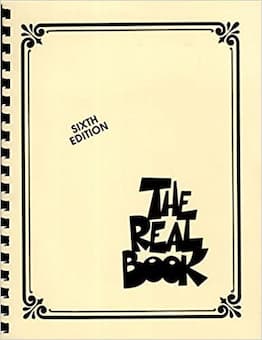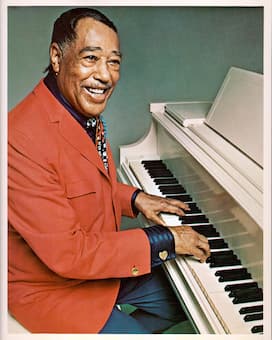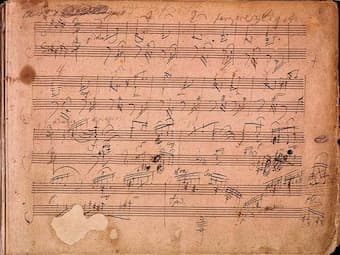
The Real Book © Amazon
As a lover of jazz, especially early jazz, the thing that pulls me towards this form is the improvisation that gives jazz its unique quality.
Not all jazz is improvised. In fact, most is not. But at the heart of jazz is improvisation. Music makers create jazz through a good knowledge of chord progression and arrangement styles. If you are a player, there’s a book called The Real Book; it’s the jazz bible. It has the lead sheets for every standard ever written. Any analysis of these standards will show you a lot of the same chord progressions.

Duke Ellington © Lakeshore Public Radio
However, at a gig, you might experience standards, but what you will definitely hear is improvisation in between and during those standards. Obviously, in a classical music concert that can never happen.
They often class Duke Ellington as America’s greatest composer. I agree. You will see at this point in this video, Ellington composing at the piano. What you don’t see him doing is writing it down on manuscript paper. That does not mean he never wrote his music down; he clearly did as he goes onto explain a little later in this clip. So, his compositions began as improvisation built upon a foundation of chord progressions and style. So does some classical music, but not a lot.
On the Road with Duke Ellington
In classical music, there are cadenzas in instrumental solo concertos. Some are left by the composer for the performer to realise. Like Jazz, this improvisation will come from a lot of knowledge of what best fits the style, key, and possible progression.
Austrian-born American violinist and composer Fritz Kreisler was known for his exhilarating cadenzas. Here is the Kreisler Cadenza from Beethoven’s Violin Concerto. I guess you could call this improvisation in a strict style. But can you improvise classical music for most of a concerto or symphony? Well, I do.
Beethoven: Violin Concerto – Kreisler’s Cadenza from 3rd movement (Augustin Hadelich, violin)
My composition and orchestration teacher was famous for saying about my works, “sounds improvised”. They were. I assume she didn’t like that. After all, what was the point of teaching me composition and orchestration if I was going to improvise? You might be able to hear the improvisation in the 3rd movement from my first piano quartet. I started with a composed dance theme, but then improvised everything in between before that theme repeats.

Beethoven’s Piano Sonata No. 30 sketch © Wikipedia
Most classical music is mapped out. It is drafted, redrafted, and well-refined before it hits the ears of music lovers. Beethoven‘s compositional method shows how he meticulously worked out most of his music. Not much was left to chance.
Almost all classical music is not improvised. That doesn’t mean that it cannot and should not be. If some of the highly structured classical music of today was more improvised, maybe it would have greater appeal. Jazz has opened up a world of compositional techniques for its creators. The major styles of jazz have been Early Jazz, Big Band and Swing Music, Bebop, Hard Bop, Cool, Free, Fusion and onto Modern Jazz, with other styles in between.
If you are a keen follower of any of these styles, you can hear how improvisation has helped develop that style. There is an endless number of videos on jazz improvisation, this is a good one. 10 Levels of Jazz Improvisation. But is this the same as a composition class? Yes. It’s just for jazz and not classical music.
10 Levels of Jazz Improvisation – How to Develop Your Improvisation
The thought of improvisation in classical music is so much a no-no, the idea has been turned into a joke by teachers and others. In this video, this pair show you what it is like when Classical Musicians Try To Improvise.
Classical Musicians Try To Improvise
Jazz has taken so much inspiration from classical music over the years. The seminal group, The Modern Jazz Quartet loved to transcribe and improvise classical music into jazz. Here they are with Brazilian guitarist and composer Laurindo Almeida, performing a Bach Fugue in A Minor. Bach is much loved in the jazz music world.
Laurindo Almeida With the Modern Jazz Quartet: Fugue in a Minor 1964
The reverse also happens, from jazz to classical. Debussy, Copland, Shostakovich, Ravel, and others all included jazz stylings in their music. Debussy’s Children’s Corner Suite could easily be a piece of modern jazz. Early church music contained improvisation. In liturgical services, improvisation provided accompaniment while there were gaps in the singing.
Debussy: Children’s Corner (Arturo Benedetti Michelangeli, piano)
Most classical music composers do not use improvisation techniques to create their music. Improvisation can be a cathartic experience, or it can come from a range of technical attributes, such as scalic work and reversing a melody, but what I find works best is simple play. Playing with an idea through singing a melody, and then at the piano, through invention finding what can grow from that as I extend the possibilities of its concept.
I don’t think most composers have ever asked themselves the question of can you improvise classical music? I think more composers should use their poetic licence to see how it can expand their musical horizons.
For more of the best in classical music, sign up to our E-Newsletter




